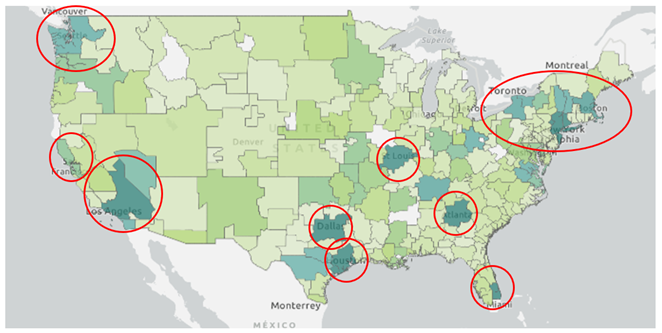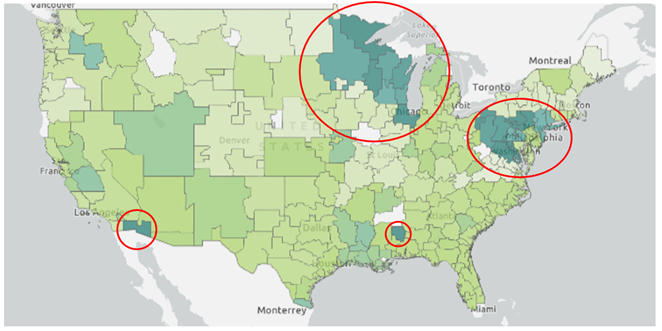
The Regional Impact of the CARES Act

Authors: Krishna Arangode, Anand Srinivasan
The Coronavirus Aid, Relief, and Economic Security (CARES) Act is an economic stimulus package meant to alleviate the economic fallout on individuals and businesses alike due to the 2020 coronavirus pandemic. Most businesses have seen their demand plummet in the last several weeks due to the shelter-in-place orders across the nation. While businesses might benefit from some of the aid packages offered by the Government, it is also critical they understand the payout to individuals by region. The disbursement of the CARES Act payout varies by region and understanding consumer cash inflow at a granular level can help many businesses target their immediate marketing activities in areas where the payout could be larger than others.
Using macro-economic data from KaizenDataLabs™, Kaizen Analytix has created an approximate distribution of payout by Metropolitan Statistical Area (MSA) for two of the federal aid programs for individuals: FPUC (Federal Pandemic Unemployment Compensation) and CARES ACT cash payout to individuals. In our analysis, metrics such as median income, population, and unemployment rates have been combined with some business-reasonable assumptions to calculate two key metrics:
- TOTAL PAYOUT: FPUC component + CARES Act Cash Component
- TOTAL PAYOUT PER CAPITA: Total Payout / Population
Figure 1: Total Payout By MSA

From the Total Payout perspective in Figure 1, total payouts follow intuition that the larger population areas are likely to receive more money. Urban areas with larger populations like Washington D.C., New York City, Houston, Dallas, Miami, Los Angeles, and Seattle lead the way in total payments from the CARES Act.
Figure 2: Total Payout Per Capita By MSA

However, looking at the Total Payout per Capita, uncovers some valuable insights:
- The cash infusion tends to move out of the urban high-density areas to rural areas with a lower median income and higher rates of unemployment
- Midwest MSAs, Pennsylvania, parts of Alabama, and parts of Arizona and California dominate
- Considering the relatively lower cost of living in these areas along with the higher per capita cash infusion, residents in the areas highlighted above are likely to have higher discretionary spend on products that are priced right
With data-driven decision making nearly ubiquitous in businesses today, COVID-19 and it’s subsequent economic impact is likely to wreak havoc on underlying analytical models. These models are likely built for more “normal” or “steady-state” operations/business environments and will be slow to react to sudden shocks like what we are all going through today with COVID-19. The analysis above could help businesses stay within the framework of agile, data-driven decision making across a variety of decisions like:
- Targeted pricing/discounting
- Regional allocation of sales inventory
- Upgrade/upsell promotions
- Workforce planning
- Logistics & supply chain planning
About Kaizen Analytix
Kaizen Analytix LLC is an analytics products and services company that gives clients unmatched speed to increased revenues, reduced costs, and maximized margins through advanced analytics solutions and actionable business insights. Working from client and industry data, Kaizen combines its Kaizen ValueAccelerators™, data, and data from KaizenDataLabs™ with proven analytics subject matter experts to rapidly deliver insights across the value chain, from Sales and Marketing to Operations and Finance. For more information, visit www.kaizenanalytix.com
More Publications
-

Automotive Innovation Series, Part 5: Supervised Machine Learning in the Automotive Sector
-

Automotive Innovation Series, Part 4: Harnessing Unsupervised Machine Learning in the Automotive Sector
-

The Future of Payment Infrastructure: Overcoming Challenges & Embracing Innovation
-

The Current State of the Financial Services Industry: Key Challenges & Priorities for the Future